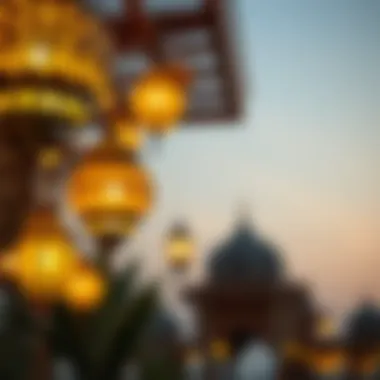Understanding Ramadan Dates in the UAE: A Comprehensive Guide


Intro
Ramadan is not just a month on the calendar for many in the UAE; it is a time steeped in profound significance, embodying spiritual reflection and communal bonding. Understanding the dates and their implications during this holy month is vital, as it influences everything from daily routines to business operations. Many people wonder how the precise dates for Ramadan are determined, given that they shift annually based on lunar observations. This guide sheds light on the chronological framework of Ramadan, its traditional practices, and that power-packed interplay between cultural customs and modern-day realities in the UAE.
Also essential is how Ramadan's impact radiates throughout various aspects of life, including real estate. With the month affecting work hours and lifestyle, real estate investors and stakeholders should be cognizant of market dynamics, as both buyers and sellers navigate unique opportunities during this time. This guide aims to provide a well-rounded view on all these facets, making it an indispensable resource for anyone looking to grasp the significance of Ramadan and its ramifications in the UAE.
With that said, let’s jump into the first section, where we explore the insightful nuances of the market during Ramadan.
The Significance of Ramadan
Ramadan holds tremendous significance in the Islamic faith, serving as a month of profound spiritual rejuvenation and communal bonding. For Muslims, this period transcends mere fasting; it’s a time for deep reflection, prayer, and connection with God. In the UAE, where a significant portion of the population observes this holy month, its impact is felt across all facets of life, from personal routines to community dynamics.
Spiritual Importance
The spiritual dimension of Ramadan is paramount. It's considered the month in which the Quran was revealed to the Prophet Muhammad. The importance of fasting during Ramadan is rooted in verses from the Quran, emphasizing discipline, devotion, and self-reflection. By abstaining from food and drink from dawn till sunset, believers are reminded of the less fortunate, promoting a sense of empathy and gratitude. This exercise of restraint is also viewed as a path to attaining a closer relationship with God, fostering spiritual growth.
As many Muslims focus their prayers during this time, they engage in additional acts of worship, such as increased recitation of the Quran and nightly prayers, known as Taraweeh. These practices not only strengthen personal faith but also reinforce communal ties. The spiritual importance of Ramadan molds individuals, encouraging attributes like patience, humility, and kindness.
Cultural Traditions
Beyond its spiritual significance, Ramadan is interwoven with rich cultural traditions in the UAE. The month brings families and friends together, creating bonds through shared meals and customs. Iftar, the meal that breaks the fast at sunset, is often a lavish affair, where families prepare traditional dishes such as dates, lentil soup, and various meats. It is common for those who can afford to do so to invite friends and community members to partake in these meals, further emphasizing the theme of unity and generosity.
Moreover, Ramadan is marked by numerous cultural events and initiatives, such as the Ramadan tent gatherings that pop up across the emirates. These venues serve meals to those in need, embodying the spirit of charity that is at the heart of the month.
"Ramadan is about more than just fasting; it's a time for giving, reflection, and connection with our communities."
These cultural traditions reflect UAE’s unique blend of modernity and heritage, promoting values like hospitality and togetherness. The customs associated with Ramadan not only foster a sense of identity among Muslims but also invite understanding and respect from non-Muslims, enriching the social fabric of the nation.
When is Ramadan Observed?
Understanding when Ramadan is observed is key for many reasons, especially for those engaging with the UAE culture and lifestyle. This holy month is not only significant for the spiritual aspects it encompasses but also affects the rhythm of daily life in many ways. Knowing the dates will help in planning activities, aligning with prayer schedules, and more so, deeply respecting the local traditions during this time.
Lunar Calendar and Its Role
The Islamic calendar, also known as the Hijri calendar, utilizes the lunar cycle. This means that each month begins with the sighting of the new moon. Hence, Ramadan, which is the ninth month of this calendar, can vary significantly each year in relation to the Gregorian calendar that many are accustomed to. The lunar year is shorter, consisting of about 354 days, therefore Ramadan shifts approximately 10 to 12 days earlier each year on the Gregorian calendar.
This reliance on lunar phases places a unique significance on Ramadan, as it instills a sense of anticipation within the community. As the crescent moon is sighted, it not only marks the beginning of fasting but also is a time for communal gathering and preparation. Traditional chants and prayers might ripple through neighborhoods as folks begin to assemble for shared meals, and this adds to the cultural fabric of the region during the month.
Variability of Dates
The dates of Ramadan can fluctuate depending on geographical differences and local moon sighting practices. In the UAE, the official start of Ramadan is confirmed through announcements from religious authorities, typically marking the day after the moon is first sighted. This can lead to situations where two neighboring countries might observe Ramadan starting on different days!
"The essence of Ramadan lies in its unity, even amid variability, where its timing fosters community spirit and cultural connection."
Such variability is crucial for not only spiritual but also practical reasons. Individuals looking to purchase property or invest during this time must consider the changes to day-to-day business operations, as the pace often slows down during fasting hours.
Ramadan Dates in the UAE


Looking ahead to 2024, Ramadan is expected to commence on the evening of Sunday, March 10th, subject to the sighting of the moon. The conclusion of Ramadan, which concludes with Eid al-Fitr, is anticipated to take place on Tuesday, April 9th. These dates will be confirmed closer to the period based on astrological observations.
For investors and business professionals, understanding these dates can impact strategic planning regarding market activities. Events might be scheduled carefully to align with the spiritual observances, ensuring the consideration of both potential clients’ sentiments and personal or family observances. Knowing when Ramadan falls in the year is not just a matter of convenience; it can deeply affect how business is conducted in the realm of property transactions and negotiations.
Practices During Ramadan
Practicing the rituals of Ramadan not only emphasizes the spiritual aspect of the holy month but also integrates cultural values and communal harmony. During this time, Muslims engage in specific practices, each serving a distinct purpose that transcends mere tradition. It is crucial for those in the UAE to understand the implications of these practices as they can affect various aspects of daily life, including business operations, education, and community interaction.
Fasting Rituals
Fasting, or sawm, is the cornerstone of Ramadan. From dawn until sunset, Muslims abstain from food, drink, and other physical needs, embracing a physical and spiritual cleanse. This fasting holds immense significance as it fosters self-discipline, self-reflection, and empathy for the less fortunate. Many may wonder about the health implications of fasting during such long days, especially in the heat of the desert.
Health experts generally recommend focusing on hydration and nutrition during non-fasting hours. A balanced iftar—often accompanied by dates and water—sets the stage for breaking the fast and replenishing the body. Some prefer lighter meals initially, transitioning into more fulfilling options afterward. In the heart of the UAE, markets bustle with vendors offering an array of traditional and modern treats, enticing those breaking their fast.
"Fasting is not just a deprivation; it’s a rich experience of mindfulness and community."
Iftar Traditions
Iftar, the meal to break the fast, is a highly anticipated event during Ramadan. Its significance runs deeper than the food served; it symbolizes community ties and shared values. Families often gather around the table, and it is common to invite friends and neighbors to join in this communal meal, fostering a sense of unity.
The traditional iftar spread commonly features dates, water, soup, and various dishes such as biryani and samosas. In many households, it’s a practice to lay out an impressive spread to ensure no one feels excluded. Restaurants also cater to the occasion, providing lavish iftar buffets, attracting large crowds. This influx of dining establishments not only creates business opportunities but also boosts the local economy during the holy month.
Community Gatherings
Ramadan serves as an ideal time for community bonding and strengthening relationships. Mosques across the UAE become vibrant hubs for worship and gatherings, where people gather for prayers and discussion. These interactions go beyond mere socializing; they build connections among diverse communities, fostering a spirit of cooperation and understanding.
Many local organizations and charities host events, promoting volunteerism and helping those in need. Food drives become commonplace, inviting people to contribute to communal meals for the less fortunate. This growing culture of kindness and generosity is not just reflective of Islamic values; it also positively influences the overall societal fabric.
In summary, the practices during Ramadan in the UAE offer a unique blend of personal reflection, cultural engagement, and community spirit. Understanding these practices provides valuable insights for investors, agents, and others interested in the UAE market, as they reveal the underlying values and dynamics during this significant time.
Impact on Daily Life
Ramadan is not merely a month of fasting; it deeply affects the daily life of those who observe its practices, especially in the UAE. The timing of daily activities is considerably altered, showcasing the reverence of Ramadan within both a social and business context. Understanding these changes gives a comprehensive view of how this holy month unwinds in various facets of life.
Business Hours Adjustments
During Ramadan, you might notice that businesses operate under modified hours. It's common for firms to shift their daily schedules to accommodate both the needs of their employees and the cultural traditions of Ramadan. Typically, working hours are shortened, allowing staff to have time for iftar, the meal that breaks the fast.
For instance, many companies start the day later—say, around 9 AM or even 10 AM—and end earlier, often by 3 PM. This not only helps in easing the fasting process but also creates a more relaxed work environment. Consequently, you may find that core functions, like meetings and project deadlines, are adjusted to better fit this schedule. This change also spills over into retail hours, where shops often stay open later into the evening to cater to shoppers looking to buy food and supplies for iftar and suhoor.
- Key Points on Business Adjustments:
- Reduced working hours from 6 hours per day.
- Shift in sales patterns, with higher sales around iftar time.
- Extended evening hours for retail shops.
School Schedules and Changes
Education institutions likewise shift gears during Ramadan. Schools often implement a modified schedule, allowing students to attend fewer hours in acknowledgement of their participation in fasting and religious activities. In many cases, classes might begin later in the day and end earlier.


Moreover, extracurricular activities are often put on hold or adjusted to fit the more spiritual and solemn atmosphere of Ramadan. Students might engage in community service, volunteering or special religious lessons aimed at enhancing their understanding of Islamic values and practices. This does foster a sense of community and solidarity among students, even as they deal with their daily challenges.
- Educational Adjustments:
- Shortened hours, typically around 4-5 hours each day.
- More flexibility toward religious observances.
- Focus on community service initiatives.
Public Behavior Norms
As the month of Ramadan progresses, public behavior norms are also transformed significantly. With fasting observed from dawn to dusk, you will notice a heightened sense of decorum. Eating, drinking, or smoking in public spaces is widely regarded as disrespectful during this time. Majority of the population exercises self-restraint, displaying a collective spirit of respect towards those who are fasting.
It’s crucial, especially for non-Muslims living in the UAE, to understand and adapt to these shifts in public behavior. In this way, they too can show respect for the local customs. Public places like parks, malls, and workplaces tend to become quieter during the day, as people are more withdrawn, either focusing on their tasks or on spiritual practices.
- Social Etiquette During Ramadan:
- Avoid public consumption of food and drinks.
- Be mindful of noise levels, particularly in public settings.
- Show respect for those who are fasting; join in on community events if possible.
Understanding such norms not only enriches the personal experience of Ramadan but nurtures harmony in multicultural environments like the UAE.
Overall, the impact of Ramadan on daily life within the UAE extends far beyond the spiritual significance; it reconfigures the rhythm of life altogether, creating a unique cultural tapestry that highlights respect, resilience, and community bonds.
Real Estate Considerations
Understanding the nuances of real estate during Ramadan in the UAE is pivotal for stakeholders—be it investors, agents, or buyers. This month not only holds religious significance, but it also brings unique dynamics to the real estate market, influencing buying and selling behaviors. The spiritual atmosphere that envelops the UAE during Ramadan makes people more charitable and community-oriented, which can translate into positive market trends.
Market Trends During Ramadan
The holy month typically sees a shift in market activity. Surprisingly, there’s often a surge in property interest, especially for homes that can cater to larger families gathering for iftar meals.
Sales often spike leading into Ramadan as families prepare for the month ahead, wanting to settle in their new homes before the festivities commence.
Several market trends of note include:
- A notable increase in rental demands might occur for properties close to mosques or community centers.
- Sales and rental prices, on the whole, can experience a temporary dip during the middle of the month when fasting may deter people from actively viewing properties.
- Luxury properties with additional facilities such as pools or entertainment areas see heightened interest as families seek comfortable entertainment places.
Furthermore, it’s common for landlords to reconsider lease terms, perhaps offering flexible payment plans to align with tenants' fasting budgets.
Changes in Property Viewing Schedules
In tandem with the variations in market dynamics, property viewing schedules undergo significant adjustments. Real estate agents often modulate their working hours to accommodate the local populace's lifestyle during Ramadan.
Potential buyers might prefer to view properties after iftar when the day’s fasting is broken, typically leading to increased evening viewings. Keeping this in mind, many agents make themselves available later in the evening, enhancing their accessibility to clients who have different routines during this month.
With the sweet scent of dates lingering in the air and gatherings in full swing, it’s essential for agents to stay flexible to cater to the specific needs of their clients during this period.
Investment Opportunities
Ramadan serves as fertile ground for savvy investors looking to tap into emerging opportunities in the real estate market. As the demand for available properties rises, certain areas may present lucrative avenues in both residential and commercial sectors.
- Houses for Larger Families: Reinforced demand for spacious homes during this month can provide opportunities for investors focusing on family-sized units.
- Commercial Properties: Popularity spikes for retail spaces close to mosques during nighttime after iftar, providing excellent opportunities for investors looking to develop businesses catering to hungry crowds.
- Mixed-Use Developments: Properties designed for both residential and commercial purposes tend to thrive during Ramadan, offering investors an edge by attracting diverse clientele.
In summary, Ramadan not only amplifies the spiritual experience for its observants but also serves as a reflective time for the real estate sector in the UAE. It might usher in unique trends that, with a careful eye and adaptive strategies, can turn into golden opportunities for those involved in the market.


By keeping tabs on these nuances, not only can investors navigate the shifting landscape effectively, but they can also capitalize on the very spirit of Ramadan, making their transactions meaningful during this sacred time.
Health and Well-being Considerations
During Ramadan, health and well-being take center stage, as millions of Muslims worldwide engage in fasting. This holy month is not just a spiritual journey; it’s also an opportunity to assess one’s physical and emotional health. In the UAE, where the climate can be harsh and temperatures soar, understanding how to maintain good health during this period is crucial.
Fasting from dawn to sunset promotes various health benefits, yet it can also present challenges. It’s essential to strike a balance to ensure that the body gets the calories and nutrients it needs while engaging in spiritual practices.
Nutritional Guidance During Fasting
Fasting in Ramadan is a profound experience, but it requires thoughtful planning to ensure nutritional needs are met. Eating occurs primarily at two times: Suhoor, the pre-dawn meal, and Iftar, the evening meal that breaks the fast.
Here are some key tips for ensuring adequate nutrition during this period:
- Hydrate: Drink plenty of water during non-fasting hours. Avoid caffeinated drinks; they can lead to dehydration. Aim for at least 8 glasses.
- Balanced Meals: Your meals should include a combination of proteins, carbohydrates, and healthy fats. Foods like chicken, lentils, whole grains, and vegetables should be staples in your Iftar and Suhoor.
- Fiber Intake: Incorporate fibers to ease digestion. Fruits and whole grains can help you feel full longer and regulate your digestive system.
- Mind Your Sweets: Traditional sweets can be tempting, but they are often high in sugars and fats. Moderation is key.
- Avoid Heavy Foods: Heavy fried foods may satisfy cravings but can lead to fatigue and discomfort.
Proper nutritional choices can enhance energy levels and stabilize mood, making the overall fasting experience more rewarding.
Emotional Impact of Fasting
Fasting during Ramadan goes beyond physical training; it touches the emotional and spiritual aspects of life. Many report a heightened sense of community, gratitude, and reflection during this time. Yet, it can also bring about feelings of frustration and fatigue, especially if the fast isn’t managed well.
The emotional effects of fasting include:
- Increased Compassion: Fasting is a reminder of the struggles of the less fortunate. Many Muslims report a heightened empathy, inspiring them to engage in charitable activities.
- Stress Levels: While fasting may induce irritation or stress in some, others find solace and peace during their spiritual reflection.
- Social Bonds: Sharing iftar meals with family and friends solidifies relationships. The emotional warmth gained through these gatherings often outweighs the challenges of fasting.
However, it’s crucial to monitor emotional well-being throughout the month. Taking breaks for self-care, seeking support when needed, and focusing on mindfulness can significantly enhance one’s emotional stability and fulfillment during Ramadan.
"Fasting is not just about abstaining from food; it’s about creating space for spiritual growth and emotional fortitude."
Healthy practices can not only enhance one's physical status during Ramadan but also significantly uplift emotional well-being, allowing the observance of this holy month to be a truly enriching experience.
Final Thoughts
As we draw the curtains on our exploration of Ramadan dates in the UAE, it’s clear that this month goes beyond mere calendars. It holds spiritual significance and offers insights into the cultural fabric of the region. Ramadan is like a cornerstone for the Muslim community, embodying themes of reflection, community, and renewal.
The Symbolism of Ramadan
Ramadan isn’t just a time for fasting; its symbolism runs deep, intertwining various aspects of life. At its core, the month is a reminder of humility and gratitude. By forgoing food and drink, Muslims globally, including those in the UAE, reconnect with their faith and cultivate empathy towards those less fortunate. This can be seen in the charity, or zakat, that often surges during this period, as many individuals focus on giving back to the community.
Moreover, the fast serves a metaphorical purpose. Picture it: an annual reset button on life’s hustle and bustle. People use this time to cleanse not just their bodies, but their minds and souls too, dividing their daily activities into more meaningful threads. It’s much like spring cleaning but for your spirit. There’s a focus on prayer, family, and relationships, creating solid bonds within the community.
In essence, Ramadan symbolizes more than abstaining from food; it’s about nurturing the soul, growing spiritually, and fostering communal ties. This sets the stage for the next topic of inquiry: the future of Ramadan dates.
Looking Forward to Future Ramadan Dates
Looking ahead, the variability of Ramadan dates raises some anticipatory questions, especially for investors and businesses in the UAE. Understanding how dates are determined means keeping an eye on the lunar calendar and its nuances. Each year, the dates shift by about ten or eleven days, creating a unique challenge and opportunity.
For businesses, being ready for Ramadan is crucial. Timing can change everything, so it’s helpful to stay informed about upcoming Ramadan calendars. Sharing this knowledge can help in planning marketing strategies or logistical arrangements efficiently. Furthermore, understanding that Ramadan will continue to evolve allows businesses and individuals alike to embrace changes in community needs and sentiments.
Anticipating future dates can also offer insights into lifestyle adaptations, community gatherings, and potential market shifts. Conversations around property sales or lease agreements can hinge on these timelines, making proactive adjustments essential.
In summary, as we reflect on these themes, it’s essential to look ahead positively and embrace the lessons and opportunities that future Ramadans will bring. Each cycle is another chance to grow and deepen one's connection, not only with oneself but also with the community at large.















